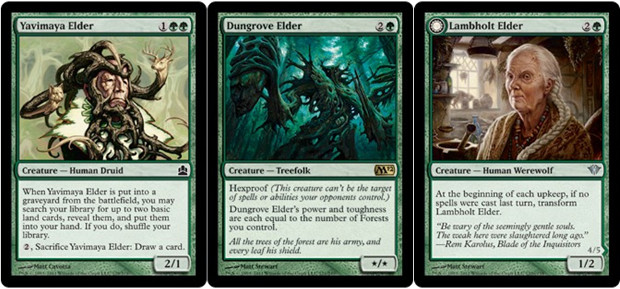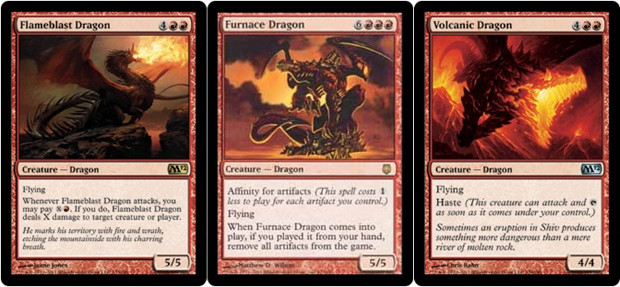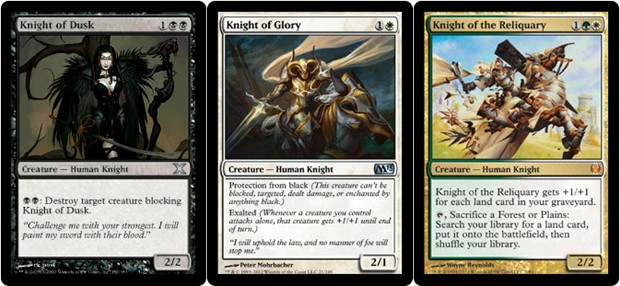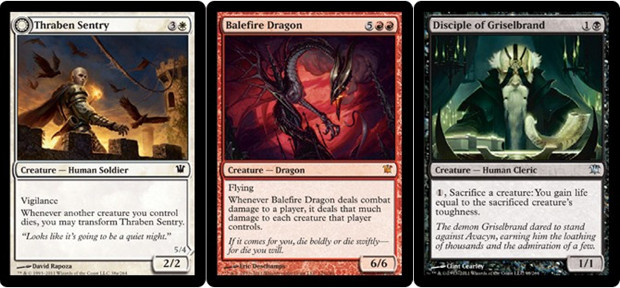Magic: The Gathering has a one-card-one-name policy. Lightning Bolt will always deal 3 damage to a target creature or player, for example, and Giant Spider will always be a 2/4 with reach for ![]()
![]() . Card names are language capital, a finite resource that must be managed to ensure the success of the game. One way to preserve this resource is to recycle card names, perhaps by creating a different Elder in various locales around the multiverse.
. Card names are language capital, a finite resource that must be managed to ensure the success of the game. One way to preserve this resource is to recycle card names, perhaps by creating a different Elder in various locales around the multiverse.
| First Printed | Total | % |
|---|---|---|
| Before 2000 | 800 | 46% |
| Before Modern card frames | 1066 | 62% |
Just under half of the one-word card names were first printed before the year 2000.
Of the ten expansions that first printed the most one-word card names, eight were released before 2000.
| Expansion | # Names | Release Date |
|---|---|---|
| Urza's Saga | 85 | Oct 1998 |
| Limited Edition Alpha | 78 | Aug 1993 |
| Ice Age | 70 | Jun 1995 |
| Odyssey | 69 | Oct 2001 |
| Tempest | 66 | Oct 1997 |
| Mercadian Masques | 63 | Oct 1999 |
| Legends | 55 | Jun 1994 |
| Ravnica: City of Guilds | 39 | Oct 2005 |
| Mirage | 37 | Oct 1996 |
| Visions | 36 | Feb 1997 |
When we look at the most current expansions, those that are currently Standard-legal, we can really see the drop off in choosing one-word card names:
| Expansion | # Names | Release Date |
|---|---|---|
| Innistrad | 14 | Sep 2011 |
| Dark Ascension | 12 | Feb 2012 |
| Avacyn Restored | 19 | May 2012 |
| Magic 2013 | 15 | Jul 2012 |
| Return to Ravnica | 19 | Oct 2012 |
| Gatecrash | 17 | Feb 2013 |
That’s fewer than one hundred cards and only 6% of the overall total. Widening the date range nearly two years, to all cards printed in 2010 or later, nearly doubles the results.
| First Printed | Total | % |
|---|---|---|
| After 2010 | 188 | 11% |
| After M12 (Standard-legal) | 96 | 6% |
Let’s take a closer look at these 188 cards. Most of them did not require much of an investment of language capital. About half are a blend of two normally unpaired words.
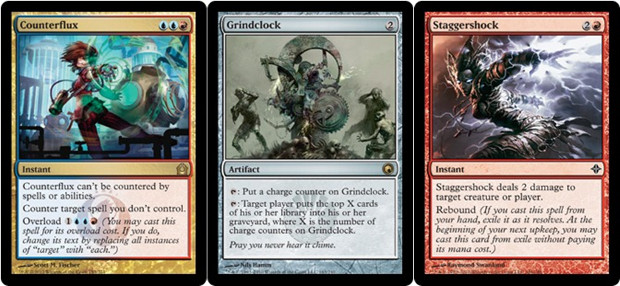
This is yet another way to extend Magic’s pool of card-name options. Just like any of the multiple-word names above, these can be split apart and their components reused: Counterclock, Grindshock, or Staggerflux for example.
A further 25% won’t be found in any English dictionary. They are either proper nouns or were custom-made for Magic.
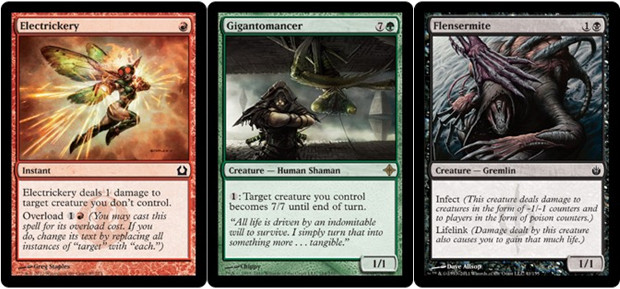
This is yet another tactic to add card names without reducing future options—there are always more words to be invented and places and beings to receive their own cards.
Worth a Word
These means 48 cards in total, fewer than 25% of the list, can be found in an English dictionary. These are the cards Wizards has decided to invest some language capital in.
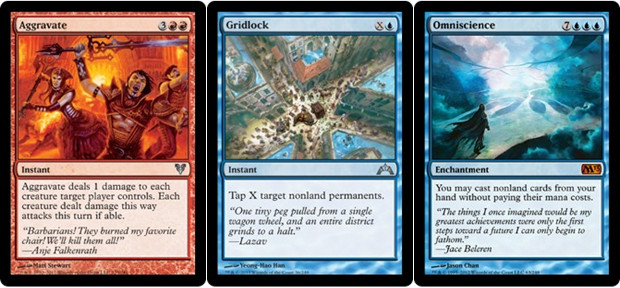
Let’s take a deeper dive and see what types of cards are most frequently worth a word and what kinds of words are used.
63% are Verbs
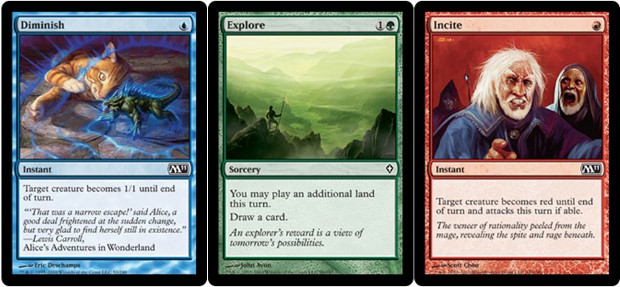
Verbs convey action: “We will Outwit the enemy,” and “The farmer will Cultivate her land,” for example. It makes sense to use straightforward card names for these actions. The player casting the spell is usually the one carrying out the action. To use one of the recycling methods on this type of card would sound awkward most of the time. “I will Dispatch your Wurmcoil Engine,” sounds more appealing than, “I will Quick Dispatch your Wurmcoil Engine.”
The rest of the list is nouns, both proper nouns like Griselbrand and common nouns like Downpour.
45% are Instants
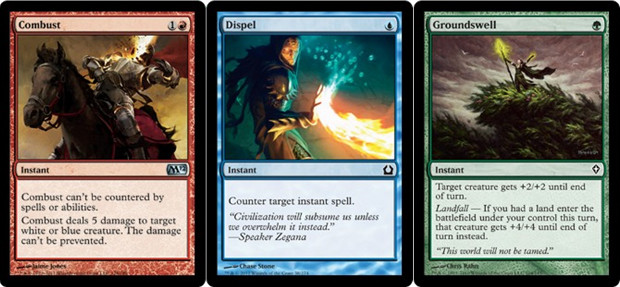
Instant-speed spells tend to denote an action of some type, and in fact, 82% of these instants are also verbs. The same case can be made for the importance of giving these cards clear, one-word names.
There are twelve enchantments on the list, which is where we find a lot of the nouns such as Agoraphobia, Claustrophobia, and Narcolepsy. There are also twelve sorceries such as Despise, Preordain, and Terminus. There is only one creature—Doorkeeper—and one artifact—Greatsword—on the list.
27% are Removal
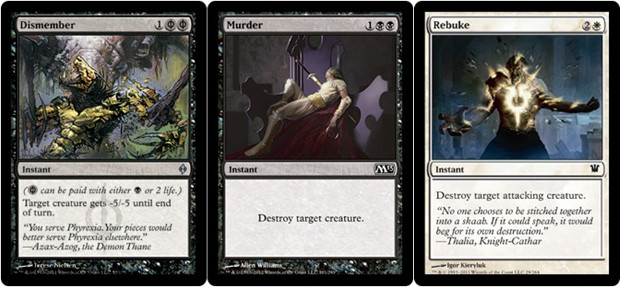
Killing and destroying things is a popular activity for planeswalkers, it would seem, and Wizards of the Coast spares no verbal expense on these cards. Another common group is threat-mitigation cards that tap permanents—such as Encrust—or reduce damage—such as Defang.
Wrapping Up
Wizards of the Coast has perfected its card-name-recycling process. This enables them to create expansion after expansion without eliminating words for future use. I hope this look into their methods of recycling has been informative and entertaining. I look forward to Dragon's Maze spoilers to see what cards are worth a real word. Thanks for reading!
Nick Vigabool













